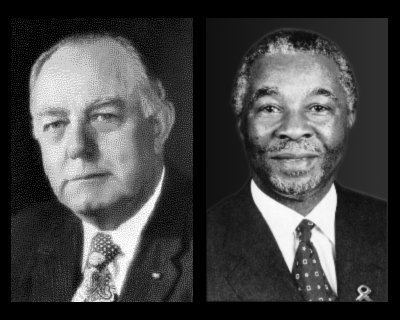Spot the difference:
It’s a peaceful and sunny Sunday morning, but the morning news is once again troubling. The president’s men are, reportedly, hoping to buy Johnnic Communications, publisher of the Sunday Times. All of it. That paper’s Buddy Naidu and Simpiwe Piliso have more on the story.
I was but a child when the Rand Daily Mail broke the news in November 1978 that the Citizen, founded two years earlier by publisher Louis Luyt, Cabinet minister Connie Mulder and secretary of information Eschel Rhoodie, had been established and secretly funded by the National Party government under state president BJ Vorster. Previously, Luyt had tried to acquire shares in South African Amalgamated Newspapers.
Now, it appears Ronnie Mamoepa, the spokesperson in the Department of Foreign Affairs — a similar role to that played by Rhoodie in the 1970s — with Titus Mafolo, a political adviser to Thabo Mbeki, and Billy Modise, former chief of state protocol, who together with delightfully named businessman Groovin Nchabeleng own a company named Koni Media Holdings, are attempting to take over Johnnic Communications.
Johncom is the publisher of several major media titles that have been vocal critics of the government and has in turn been singled out for tongue-lashings by Mbeki, assorted state officials and the public broadcaster. The titles include the Sunday Times, the Sowetan, and half of the Financial Mail and Business Day. Mamoepa and company have applied for funding from, among others, the state-owned Public Investment Corporation.
Thabo Mbeki on Friday laid into the media, saying that the government was not attempting to stifle press freedom.
“A few of these have even attempted to make comparisons with the repugnant apartheid government, which in 1977 banned a number of publications, including the World and the Weekend World,” Mbeki reportedly said.
How hollow his denial rings today. What the repugnant apartheid government also did in 1977 was publish the Citizen, denying all the while that it was funded by government money, that it exercised editorial control or that it was engaged in a National Party propaganda and misinformation campaign. The affair led to the resignation of the state president, BJ Vorster.
One ANC MP has already spoken out against the deal. Kader Asmal is quoted as saying it is “astonishing that civil servants are able to develop time and energy for what is really a takeover bid”. He argues that at issue is the danger of control of newspapers by politically active people. Perhaps he should consider tabling a Bill in Parliament preventing civil servants or “politically active people” from owning interests in media companies. That goes for the stake Tokyo “Berlusconi” Sexwale’s company, Mvelaphanda, is acquiring in Johncom, too.
I’ve written before about the worrying similarities between the socio-economic policies of this government and the apartheid regime — both practising a form of national socialism or state corporatism. In this essentially political affair, the parallels with the first Info Scandal are even more uncanny. They are frightening. Who, for example, will be playing the role of PW Botha, who stepped into the power vacuum left after Vorster’s resignation?
(This is an edited version of a post first published here.)



